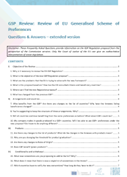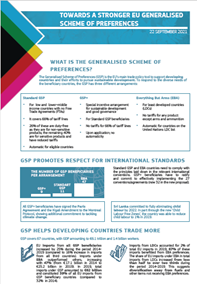Provisional agreement on the new GSP regulation
On 1 December 2025, the European Commission, the European Council and the European Parliament reached an agreement to revise the GSP. The new scheme will preserve many elements of the current one – including the lists of products benefitting from preferences under the three arrangements (the standard GSP, GSP+, and EBA), but it will improve some of the key features of the scheme in responding to the evolving needs and challenges of GSP countries. It will also reinforce the scheme’s social, labour, environmental, and climate dimensions.
The new scheme will:
- Ensure a smoother transition for countries that are moving up in their development status by allowing them to retain preferential EU market access if they meet sustainability standards and therefore join the GSP+ arrangement;
- Create more opportunities for low-income countries by lowering product graduation thresholds;
- Promote stronger human rights and labour standards by adding new conventions, which beneficiary countries should respect;
- Introduce the possibility to withdraw benefits from standard GSP and EBA beneficiaries for environmental and climate violations;
- Improve and clarify monitoring, transparency, and civil society involvement, and introduce an urgent withdrawal procedure;
- Make a link with beneficiary countries’ responsibility of readmitting their own nationals in case of irregular migration issues; and
- Provide additional tools for responding to market disturbances, in particular for agriculture.
New international conventions
The following international conventions and agreements will be added to the list of GSP-relevant conventions:
- The Optional Protocol to the Convention on the Rights of the Child on the Involvement of Children in Armed Conflict (2000);
- The Convention on the Rights of Persons with Disabilities (2007);
- The ILO Convention on Labour Inspection No. 81 (1947);
- The ILO Convention on Tripartite Consultations No. 144 (1976);
- The Paris Agreement on Climate Change (2015), which will replace the Kyoto Protocol;
- The United Nations Convention against Transnational Organised Crime (2000).
Next steps
The provisional agreement will now be endorsed by the Council and the Parliament, before being formally adopted. The work continues at technical level and a final text is expected to be available by mid-2026. The legislation will apply from 1 January 2027.
Current GSP+ beneficiaries will continue to benefit from GSP+ preferences during a two-year transition period (i.e., until 31 December 2028), but will then need reapply for GSP+ status under the new Regulation, as there will be new conditions and a new legal basis. The reapplication will also need to include an action plan for effective implementation of the full list of conventions.
---
Background
Here is a summary of the process that led to the agreement on the new GSP regulation:
The European Commission's proposal for a revised GSP regulation 2024 to 2034
The current GSP framework is based on Regulation (EU) No 978/2012 and was set to expire on 31 December 2023. The European Commission therefore adopted a legislative proposal renewing the Generalised Scheme of Preferences (GSP) for the period 2024 to 2034 on 22 September 2021.
Based on the insights gained through the Mid-term Evaluation of the GSP and the recently conducted Study on the GSP Review, the European Commission proposed several adjustments to the current Regulation, reflecting changes in circumstances and challenges GSP beneficiary countries face. While the main characteristics of the scheme would be maintained, the European Commission aimed to tie the GSP Regulation even stronger to its objectives of reducing poverty, enhancing export opportunities, and incentivising sustainable economic development. Another objective of the proposal was to better reflect the challenges of this decade and the EU’s policy priorities especially in the area of climate change and sustainability.
The main changes of the Commission’s proposal can be summarised as follows (reflecting the state in 2021).
Arrangements and beneficiary countries
Until 2026, seven beneficiary countries of the ‘Everything but Arms’ (EBA) are expected to graduate from the Least Developed Country (LDC) category. This implies that they will also graduate from the EBA after a transition period of three years. Countries that are expected to graduate within this timeframe include Bhutan (December 2023), Angola (February 2024), Solomon Islands (December 2024), and São Tomé and Príncipe (December 2024), as well as Laos, Nepal and Bangladesh (expected to graduate in 2026 with an extended preparatory period). Based on the current provisions, Bangladesh would not meet the existing vulnerability criterion. The graduation from LDC status would, however, imply a substantial trade loss and serious shock to the country’s GDP which could be mitigated through inclusion in the GSP+ scheme. The new GSP proposal removes the import-share criterion from the GSP+ vulnerability criteria, which ensures a smoother transition to GSP+ status for the aforementioned countries after they graduate from EBA.
Conditionality
The current GSP Regulation integrates various degrees of conditionality in the different arrangements of the GSP. Beneficiary countries of the Standard GSP and the EBA are required to comply with the core principles of the 15 fundamental conventions on human and labour rights (negative conditionality). The GSP+ takes this conditionality one step further by requiring beneficiary countries to also ratify and effectively implement 27 international conventions including human and labour rights, good governance, and environmental protection (positive conditionality). In its proposal, the European Commission suggests expanding the negative conditionality for EBA and Standard GSP beneficiaries to all 27 conventions including on good governance and the environment. This implies that serious and systematic violations of the principles included in the good governance and environmental conventions could be cause for launching a withdrawal investigation procedure (see legislative proposal, Chapter V., Article 19.1(a)).
Conventions
At the same time, the Commission suggested amending the list of international conventions that are covered by the GSP+ Regulation. To date, this list includes 27 conventions on human rights, labour rights, good governance, and environmental protection. The Commission’s proposal expanded this list by two human rights instruments, two labour rights conventions, one governance convention and one environmental instrument (see legislative proposal, Annex VI). More specifically, this would include:
- Optional Protocol to the Convention on the Rights of the Child on the Involvement of Children in Armed Conflict (2000) (Area: Human Rights, monitoring body: Committee on the Rights of the Child (CRC))
- Convention on the Rights of Persons with Disabilities (2007) (Area: human rights, monitoring body: Committee on the Rights of Persons with Disabilities)
- Convention on Labour Inspection No 81 (1947) (Area: labour rights, monitoring body: Committee of Experts on the Application of Conventions and Recommendations (CEACR))
- Convention on Tripartite Consultations No 144 (1976) (Area: labour rights, monitoring body: Committee of Experts on the Application of Conventions and Recommendations (CEACR))
- The Paris Agreement on climate change (2015) [Note: it replaces the Kyoto Protocol] (Area: environmental protection)
- United Nations Convention against Transnational Organised Crime (2000) (Area: good governance)
Current beneficiaries of the GSP+ arrangement would be given a two-year transition period to meet the additional requirements and reapply to the GSP+ scheme until 31 December 2025. They will continue to benefit from GSP+ preferences throughout the application process (see legislative proposal, Chapter III, Article 10.8)
Withdrawal
Together with the reinforcement of the conditionality under the GSP Regulation, the European Commission proposed adjustments to the withdrawal procedure allowing the European Commission to react more flexibly and timely to serious and systematic violations of the covered conventions. Part of the proposal was to carry out socio-economic impact assessments as part of the withdrawal procedure to ensure that the withdrawal of preferences reflects country-specific circumstances. The Commission also proposed to broaden the set of indicators that are taken into consideration, including for example migration (see legislative proposal, page 20). The extension of the list of included conventions and the negative conditionality, at the same time, would enhance the Commission’s leverage on issues relating to good governance and environmental protection.
GSP+ monitoring
Following the recommendation of the Mid-term Evaluation, the European Commission proposed concrete steps to enhance the transparency of the GSP+ monitoring. This includes publishing a detailed description of the monitoring process including the involvement of various stakeholders. Furthermore, as suggested by the Mid-term Evaluation and the Study on the Review of the GSP Regulation, the European Commission proposed to extend the GSP monitoring cycle from two to three years. This would align the GSP+ monitoring with the reporting cycles of major international conventions (see legislative proposal, Chapter III. Article 14).
Product graduation and safeguards
While the proposal did not include any substantial changes to the list of covered products or the safeguard mechanism, the Commission suggested calculating safeguard thresholds based on import values rather than volumes. This would align it with the calculation of the graduation thresholds. The future GSP framework should be better focussed on those products which are less competitive and those countries most in need of preferential access. Therefore, the proposal suggested lowering the product graduation and safeguard thresholds by 10 percentage points (see legislative proposal, Chapter VI, Article 29.1 on safeguards and surveillance and Annex VI). Safeguard measures do not apply to EBA beneficiary countries and exclude those beneficiary countries with a share for the relevant products below 6 % of total Union imports of the same products. The product graduation mechanism only applies to beneficiary countries of the standard GSP.
Proposal to extend the current GSP Regulation until the end of 2027
In July 2023, the European Commission put forth a proposal to extend the Generalized Scheme of Preferences (GSP) for the period 2024-2027, as the current EU GSP regulation is set to expire at the end of 2023. This extension of the current scheme is crucial to allow GSP and GSP+ beneficiaries to continue enjoying tariff preferences, as the Council and Parliament had not yet reached an agreement on the Commission's proposals to update GSP rules. Read the text of the proposal by clicking on either of the following sources:
Extension of the current GSP Regulation until the end of 2027
In November 2023, the Council and European Parliament extended the current GSP Regulation by three years, to the end of 2027. Given that an agreement has now been reached, the new GSP Regulation will however already supersede the extension of the the current one from 1 January 2027.
Additional information


Factsheet-GSP Review Q&A GSP Review
- Summary of the Commission Proposal for a revised GSP Regulation (September 2021)
- Council Compromise on a revised GSP Regulation (December 2022)
- Information by the European Parliament about the GSP review and its current status (updated December 2025)
- Press releases on the provisional agreement on the new GSP (1 December 2025): European Commision, European Council